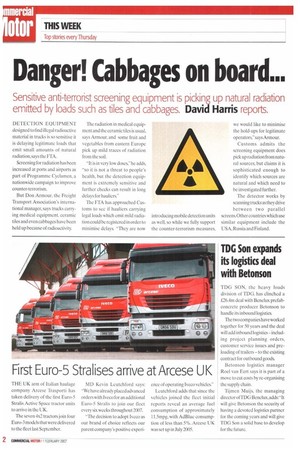Danger! Cabbages on board...
Page 12

If you've noticed an error in this article please click here to report it so we can fix it.
Sensitive anti-terrorist screening equipment is picking up natural radiation emitted by loads such as tiles and cabbages. David Harris reports.
DETECTION EQUIPMENT designed to find illegal radioactive material in trucks is so sensitive it is delaying legitimate loads that emit small amounts of natural radiation, says the VIA.
Screening for radiation has been increased at ports and airports as part of Programme Cyclamen, a nationwide campaign to improve counter-terrorism.
But Don Armour, the Freight Transport Association's international manager, says trucks carrying medical equipment, ceramic tiles and even cabbages have been held up because of radioactivity. The radiation in medical equipment and the ceramic tiles is usual, says Armour, and some fruit and vegetables from eastern Europe pick up mild traces of radiation from the soil.
It is in very low doses," he adds, "so it is not a threat to people's health, but the detection equipment is extremely sensitive and further checks can result in long delays for hauliers."
The FTA has approached Customs to see if hauliers carrying legal loads which emit mild radiation could be registered in order to minimise delays. "They are now we would like to minimise the hold-ups for legitimate operators," says Armour.
Customs admits the screening equipment does pick up radiation from natural sources, but claims it is sophisticated enough to identify which sources are natural and which need to be investigated further.
The detector works by scanning trucks as they drive between two parallel screens. Other countries which use similar equipment include the USA, Russia and Finland.


























































































































































































